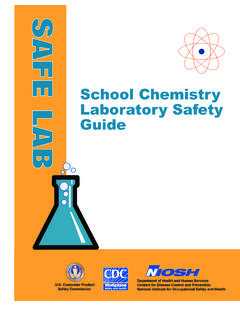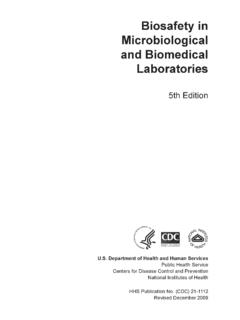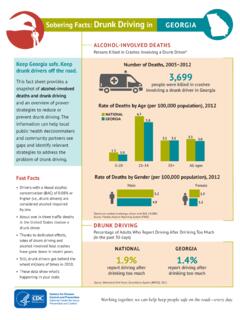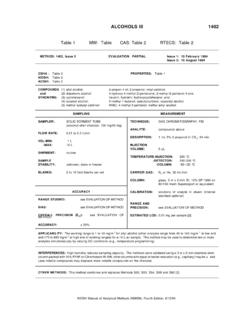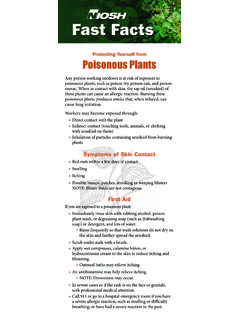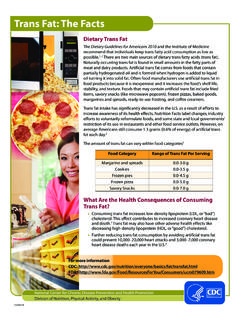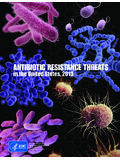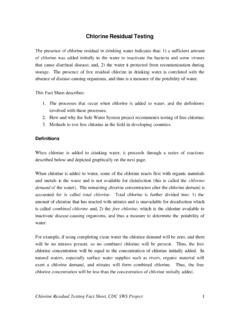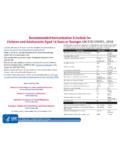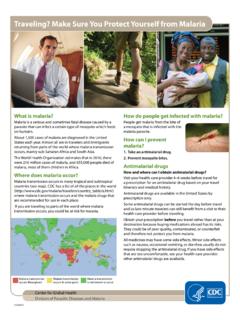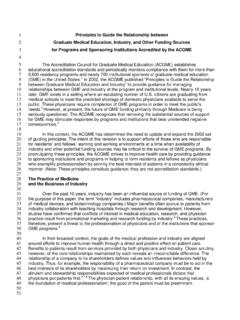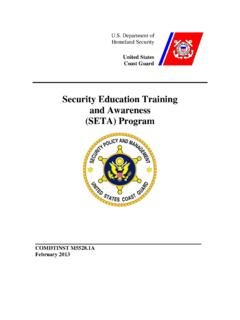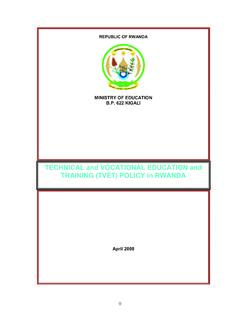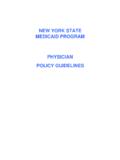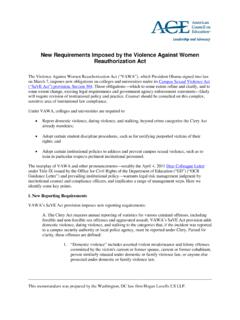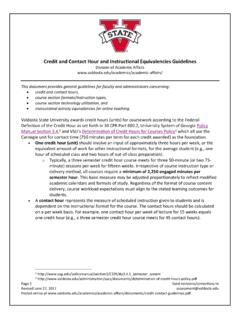Transcription of Competency Guidelines for Public Health Laboratory ...
1 Supplement / Vol. 64 / No. 1 May 15, 2015 Department of Health and Human ServicesCenters for Disease Control and PreventionMorbidity and Mortality Weekly ReportCompetency Guidelines for Public Health Laboratory ProfessionalsCDC and the Association of Public Health LaboratoriesSupplementThe MMWR series of publications is published by the Center for Surveillance, Epidemiology, and Laboratory Services, Centers for Disease Control and Prevention (CDC), Department of Health and Human Services, Atlanta, GA citation: [Author names; first three, then et al., if more than six.] [Title]. MMWR Suppl 2015;64(Suppl-#):[inclusive page numbers].Centers for Disease Control and PreventionThomas R. Frieden, MD, MPH, Director Harold W. Jaffe, MD, MA, Associate Director for Science Joanne Cono, MD, ScM, Director, Office of Science Quality Chesley L. Richards, MD, MPH, Deputy Director for Public Health Scientific ServicesMichael F. Iademarco, MD, MPH, Director, Center for Surveillance, Epidemiology, and Laboratory Services MMWR Editorial and Production Staff (Serials)Sonja A.
2 Rasmussen, MD, MS, Editor-in-ChiefCharlotte K. Kent, PhD, MPH, Executive Editor Christine G. Casey, MD, EditorTeresa F. Rutledge, Managing EditorDavid C. Johnson, Lead Technical Writer-EditorJeffrey D. Sokolow, MA, Project EditorMartha F. Boyd, Lead Visual Information SpecialistMaureen A. Leahy, Julia C. Martinroe, Stephen R. Spriggs, Visual Information SpecialistsQuang M. Doan, MBA, Phyllis H. King,Terraye M. Starr, Information Technology SpecialistsMMWR Editorial BoardWilliam L. Roper, MD, MPH, Chapel Hill, NC, ChairmanMatthew L. Boulton, MD, MPH, Ann Arbor, MIVirginia A. Caine, MD, Indianapolis, INJonathan E. Fielding, MD, MPH, MBA, Los Angeles, CADavid W. Fleming, MD, Seattle, WAWilliam E. Halperin, MD, DrPH, MPH, Newark, NJKing K. Holmes, MD, PhD, Seattle, WATimothy F. Jones, MD, Nashville, TNRima F. Khabbaz, MD, Atlanta, GAPatricia Quinlisk, MD, MPH, Des Moines, IAPatrick L. Remington, MD, MPH, Madison, WIWilliam Schaffner, MD, Nashville, TNCONTENTS (Continued)CONTENTSI ntroduction.
3 1 Methodology ..2 Guiding Principles ..5 Competencies and Skill Domains ..5 Quality Management System Competency Guidelines ..8 Ethics Competency and Leadership Competency Guidelines ..15 Communication Competency Guidelines ..20 Security Competency Guidelines ..23 Emergency Management and Response Competency Guidelines .26 Workforce training Competency Guidelines ..29 General Laboratory Practice Competency Guidelines ..32 Safety Competency Guidelines ..36 Surveillance Competency Guidelines ..45 Informatics Competency Guidelines ..49 Microbiology Competency Guidelines ..62 Chemistry Competency Guidelines ..68 Bioinformatics Competency Guidelines ..72 Research Competency Guidelines ..74 Conclusion ..78 Acknowledgments ..78 References ..78 Appendix A ..82 Appendix B ..83 SupplementMMWR / May 15, 2015 / Vol. 64 / No. 1 1 Competency Guidelines for Public Health Laboratory ProfessionalsCDC and the Association of Public Health LaboratoriesPrepared byRen e Ned-Sykes, PhD1 Catherine Johnson, MA2 John C.
4 Ridderhof, DrPH1 Eva Perlman, MPH2 Anne Pollock3 John M. DeBoy, DrPH21 Office of Public Health Scientific Services, Center for Surveillance, Epidemiology, and Laboratory Services, CDC, Atlanta, Georgia2 Association of Public Health Laboratories, Silver Spring, Maryland3 Office of Public Health Scientific Services, Center for Surveillance, Epidemiology, and Laboratory Services, Division of Laboratory Systems, CDC, Atlanta, GeorgiaCorresponding preparer: Ren e Ned-Sykes, Competency Guidelines outline the knowledge, skills, and abilities necessary for Public Health Laboratory (PHL) professionals to deliver the core services of PHLs efficiently and effectively. As part of a 2-year workforce project sponsored in 2012 by CDC and the Association of Public Health Laboratories (APHL), competencies for 15 domain areas were developed by experts representing state and local PHLs, clinical laboratories, academic institutions, Laboratory professional organizations, CDC, and APHL.
5 The competencies were developed and reviewed by approximately 170 subject matter experts with diverse backgrounds and experiences in Laboratory science and Public Health . The Guidelines comprise general, cross-cutting, and specialized domain areas and are divided into four levels of proficiency: beginner, competent, proficient, and expert. The 15 domain areas are 1) Quality Management System, 2) Ethics, 3) Management and Leadership, 4) Communication, 5) Security, 6) Emergency Management and Response, 7) Workforce training , 8) General Laboratory Practice, 9) Safety, 10) Surveillance, 11) Informatics, 12) Microbiology, 13) Chemistry, 14) Bioinformatics, and 15) Competency Guidelines are targeted to scientists working in PHLs, defined as governmental Public Health , environmental, and agricultural laboratories that provide analytic biological and/or chemical testing and testing-related services that protect human populations against infectious diseases, foodborne and waterborne diseases, environmental hazards, treatable hereditary disorders, and natural and human-made Public Health emergencies.
6 The competencies support certain PHL workforce needs such as identifying job responsibilities, assessing individual performance, and providing a guiding framework for producing education and training programs. Although these competencies were developed specifically for the PHL community, this does not preclude their broader application to other professionals in a variety of different work national network of governmental Public Health , environmental, and agricultural laboratories, referred to collectively as Public Health laboratories (PHLs), is a vital part of the Public Health infrastructure. These laboratories perform multiple functions through provision of analytic biological and/or chemical testing and testing-related services that protect human populations from infectious diseases, foodborne and waterborne diseases, environmental hazards, treatable hereditary disorders, and other natural and human-made Public Health emergencies (1 3).
7 A well-trained Laboratory workforce is essential to ensuring that PHLs have the capacity to carry out the critical activities that are needed to safeguard the Public s Health competently and effectively (4,5).Studies of the PHL workforce have drawn attention to several concerns about staff training and projected turnover, both of which highlight challenges to maintaining a sufficient number of highly skilled and competent workers. A 2011 national PHL workforce characterization survey found that approximately one third of PHL directors nationally expected 16% 25% of their workforce to retire, resign, or be released in the subsequent 5 years, while 12% anticipated losing 26% 50% of their workforce during that time period (6,7). Approximately 30% of the individual scientific staff respondents expected to continue working in a PHL for <5 years (6). These findings largely reflect workforce demographics, because more than half of scientific Laboratory staff were aged >45 years (6).
8 Important recruitment and retention challenges for the PHL workforce also have been identified, including the lack of Supplement2 MMWR / May 15, 2015 / Vol. 64 / No. 1established progressive job series (commonly termed career ladders in the PHL community) for PHL scientists (6 8) and the lack of adequate opportunities for training and professional development (6,7). Indeed, approximately 50% of laboratories reported no, minimal, or only partial capacity to provide continuing education and training to their workers (6,7). Lack of adequate training poses challenges because PHL scientists and managers require a range of scientific, leadership, and managerial development courses, ideally based on core competencies, to function effectively in their positions (9 11).Multiple national professional organizations, including the Institute of Medicine, the Association of Schools and Programs of Public Health , and the Public Health Foundation/Council on Linkages Between Academia and Public Health Practice (Council on Linkages), among others, have endorsed Competency development as a means of strengthening the Public Health workforce (12 15).
9 Competencies improve the workforce by providing a guiding framework for producing education and training programs, identifying worker roles and job responsibilities, and assessing individual performance and organizational capacity (12 18).Competencies are action-oriented statements that delineate the essential knowledge, skills, and abilities that are critical to the effective and efficient performance of work (19); competencies should be observable and measurable. Several Public Health professional disciplines have developed competencies, often through federal partnerships, to address workforce education and training needs (14,15,19 24), and Competency -based curriculum development has been suggested as the ideal method for training Public Health workers and Public Health students (10,11,13,18,25). In 2009, CDC and APHL collaborated to develop Guidelines for biosafety Laboratory Competency (26), followed by development of this broader set of Guidelines for PHL professional purpose of these Guidelines is to outline the knowledge, skills, and abilities that Public Health Laboratory professionals (principally scientists, managers, and leaders) need to deliver the core services of PHLs efficiently and effectively.
10 These Guidelines establish core competencies that can help direct workforce development efforts in PHLs in the United States. Because the competencies are universal in nature for many Laboratory disciplines, the Guidelines also have potential value for laboratories (including those not characterized as Public Health laboratories) located in both developed and developing and APHL have engaged collectively in multiple Laboratory workforce improvement efforts over the past several years, providing the foundation for the development of these Guidelines . More information about these efforts is available at The 2011 launch of the Laboratory Efficiencies Initiative (27) was intended to assist PHLs in achieving long-term sustainability and resulted in recommendations from multiple forums to focus greater efforts on PHL workforce development. As part of these efforts, APHL collaborated with CDC in 2012 to develop a comprehensive set of competencies that built on APHL s earlier work to draft competencies for PHL professionals across several topic areas (APHL, unpublished draft, 2011).
